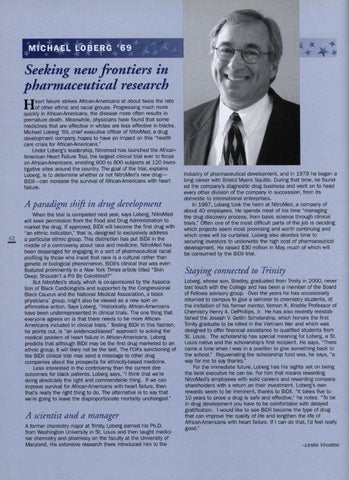Seeking new frontiers in pharmaceutical research H
eart failure strikes African-Americans at about twice the rate of other ethnic and racial groups. Progressing much more quickly in African-Americans, the disease more often results in premature death. Meanwhile, physicians have found that some medicines that are effective in whites are less effective in blacks. Michael Loberg '69, chief executive officer of NitroMed, a drug development company, hopes to have an impact on this " health care crisis for African-Americans." Under Loberg's leadership, Nitromed has launched the AfricanAmerican Heart Failure Trial, the largest clinical trial ever to focus on African-Americans, enrolling 600 to 800 subjects at 120 investigative sites around the country. The goal of the trial, explains Loberg, is to determine whether or not NitroMed's new drugBiDil-can increase the survival of African-Americans with heart failure.
A paradigm shift in drug development
62
When the trial is completed next year, says Loberg, NitroMed will seek permission from the Food and Drug Administration to market the drug. If approved, BiDil will become the first drug with "an ethnic indication," that is, designed to exclusively address a particular ethnic group. This distinction has put BiDil in the middle of a controversy about race and medicine. NitroMed has been disparaged for engaging in a sort of pharmaceutical racial profiling by those who insist that race is a cultural rather than genetic or biological phenomenon. BiDil 's clinical trial was even featured prominently in a New York Times article titled "Skin Deep: Shouldn't a Pill Be Colorblind?" But NitroMed's study, which is co-sponsored by the Association of Black Cardiologists and supported by the Congressional Black Caucus and the National Medical Association , a black physicians ' group, might also be viewed as a new spin on affirmative action. Says Loberg, "Historically, African-Americans have been underrepresented in clinical trials. The one thing that everyone agrees on is that there needs to be more AfricanAmericans included in clinical trials." Testing BiDil in this fashion , he points out, is "an evidenced-based " approach to solving the medical problem of heart failure in African-Americans. Loberg predicts that although BiDil may be the first drug marketed to an ethnic group, it will likely not be the last. The FDA's sanctioning of the BiDil clinical trial may send a message to other drug companies about the prospects for ethnicity-based medicine. Less interested in the controversy than the current dire outcomes for black patients, Loberg says, "I think that we're doing absolutely the right and commendable thing. If we can improve survival for African-Americans with heart failure , then that's really the right thing to do. The alternative is to say that we 're going to leave the disproportionate mortality unchanged.''
A scientist and a manager A former chemistry major at Trinity, Loberg earned his Ph.D. from Washington University in St. Louis and then taught medicinal chemistry and pharmacy on the faculty at the University of Maryland. His extensive research there introduced him to the
industry of pharmaceutical development, and in 1979 he began a long career with Bristol Myers Squibb. During that time, he founded the company's diagnostic drug business and went on to head every other division of the company in succession, from its domestic to international enterprises. In 1997, Loberg took the helm at NitroMed, a company of about 40 employees. He spends most of his time " managing the drug discovery process, from basic science through clinical trials." Often one of the most difficult parts of the job is deciding which projects seem most promising and worth continuing and which ones will be curtailed . Loberg also devotes time to securing investors to underwrite the high cost of pharmaceutical development. He raised $30 million in May, much of which will be consumed by the BiDil trial.
Staying connected to Triniry Loberg, whose son , Bradley, graduated from Trinity in 2000, never lost touch with the College and has been a member of the Board of Fellows advisory group. Over the years he has occasionally returned to campus to give a seminar to chemistry students, at the invitation of his former mentor, Vernon K. Krieble Professor of Chemistry Henry A. DePhillips, Jr. He has also recently reestablished the Joseph V. Getlin Scholarship, which honors the first Trinity graduate to be killed in the Vietnam War and which was designed to offer financial assistance to qualified students from St. Louis. The scholarship has special meaning for Loberg, a St. Louis native and the scholarship's first recipient. He says , "There came a time when I was in a position to give something back to the school." Rejuvenating the scholarship fund was, he says, "a way for me to say thanks." For the immediate future , Loberg has his sights set on being the best executive he can be. For him that means rewarding NitroMed 's employees with solid careers and rewarding company shareholders with a return on their investment. Loberg's own rewards seem to be imminent, thanks to BiDil. "It takes five to 10 years to prove a drug is safe and effective,'' he notes. "To be in drug development you have to be comfortable with delayed gratification. I would like to see BiDil become the type of drug that can improve the quality of life and lengthen the life of African-Americans with heart failure . If I can do that, I'd feel really good ." - Leslie Virostek
